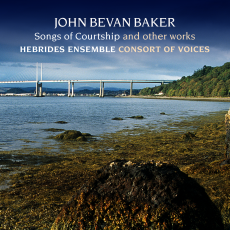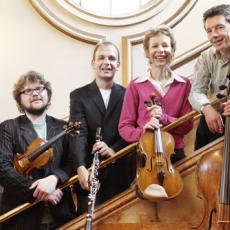John Bevan Baker - Hebrides Ensemble - McAlister Matheson
Born in Middlesex in 1926 to an English father and a Scottish mother, John Bevan Baker studied organ and composition at the Royal College of Music; afer a brief stint as Assis-tant Organist at Westminster Abbey, the pull of his Scottish roots proved too strong and he moved to Aberdeen as City Carillonneur. He taught music in Aberdeen, then at Fortose Academy and in Glasgow before retiring to Fortrose. There his creativity blossomed and he wrote many works. Some were commis-sioned by professional musicians, others for school and community groups (including the Black Isle Singers, an amateur choir founded by him in 1985). That some of his choral settings, instrumental and chamber music have found their way onto CD is a tribute not only to the enterprising Linn record label but also to the efforts of his son-in-law, cellist William Conway, whose belief in the quality of Bevan Baker's music is shown to be entirely justified. This disc contains a fascinating mixture of pieces. Eclogue for mixed quintet (oboe, bassoon, violin, cello and piano), written in 1994 just before he died, is a short, intense rhapsody, sparingly written but with a haunting lyricism. Triptych for cello and piano, 1980, displays the same economy of style; the chromatic four-note motif that opens the energetic allegro is found in various guises in the beautiful, dreamy central movement and in the driving, sparkling allegro vivace. A Song for Kate, written in celebration of his first grandchild's birth, is a warm berceuse for string ensemble, and the light-hearted but spirited Spring for solo violin is equally beguiling. Duo for oboe and cello and Suite for Piano complete the chamber and instrumental music. Of the two choral works, Songs of Courtship, scored for four-part choir and piano duet, is the more distinctive, setting thirteen texts (translated from the Ancient Chinese) with great imagination, sometimes light-footed, sometimes more robust and even lush, but always rhythmically challenging. The opening of the first song is almost Britte-nesque in character, reminiscent of the Ceremony of Carols, while elsewhere there are hints of Vaughan Williams, Bridge and Howells. This enchanting cycle is sung with great affection by the Consort of Voices, who are joined by strings, organ, trumpet and tubular bells for Bevan Baker's colourful setting of 15th century Scottish poet William Dunbar's poem Rorate Coeli Desuper. The CD booklet foreword by Sir Peter Maxwell Davies perfectly sums up Bevan Baker's music: "This is beautifully crafted, transpar-ently honest music, of great warmth and melodic fecundity, and I am delighted it is receiving wider attention."

